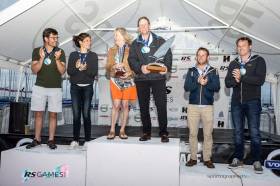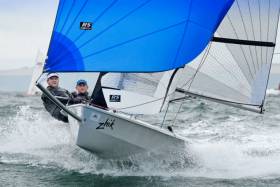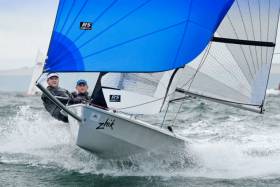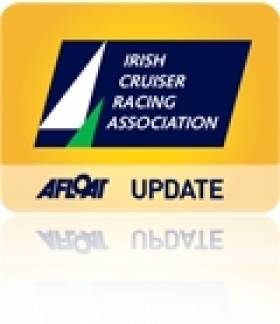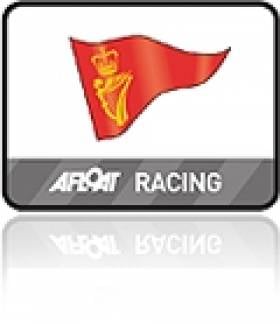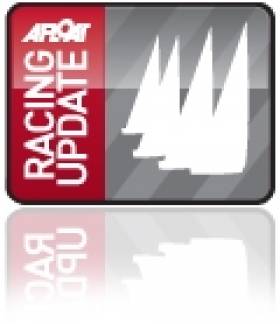Displaying items by tag: Richard Leonard
Cork Harbour’s Barry & Leonard Third In RS400 Europeans
#RS400 - Alex Barry and Richard Leonard finished third in the RS400 Europeans at Weymouth this week.
The Cork Harbour duo completed an international podium, with Stewart and Sarah Robertson of Scotland taking the win and Francisco and Teresa Lobato of Portugal in second.
Sailing was very tight throughout the five days of racing for the 71-boat fleet, with Barry reporting that any one of five boats was capable of taking the event in the last race.
Notable entries included double Olympic silver medalist and Volvo Ocean Race winner Ian Walker, who was ninth overall.
Robbie O’Sullivan and Phil McGlade were the other Irish boat traveling, with a 33rd place finish in the Gold fleet. Full results are here.
The event was part of the wider RS anniversary games, which will see 2,000 sailors take to the water at the Weymouth and Portland National Sailing Academy by the end of this month.
Fourth For Barry & Leonard At RS400 UK Nationals
#RS400 - A solid fifth in the final race of the RS400 UK Nationals yesterday (Thursday 24 August) capped off a week that saw Alex Barry and Richard Leonard finish fourth overall.
The ultimate result was even more satisfying for the Royal Cork/Monkstown Bay pair as they were among the few boats to get ahead of potentially race-stopping sea breeze, one that opened a sizeable hole in the course on Mount’s Bay and left most of the fleet in confusion, as Yachts and Yachting reports.
It was also much consolation after a disappointing first race on the day — Barry and Leonard’s worst placing of the week at 29th but one that discards ensured wouldn’t blemish their final tally.
As predicted, John Gorringe and Oli Wells of Parkstone Yacht Club took the championship with a bullet in the very last race of the five-day event, though it wasn’t a sure thing after a seventh in Thursday’s first race took a chunk out of their lead and added to the pressure.
Meanwhile, three other Irish boats in the fleet showed strong performances in Cornwall this week.
Monkstown Bay’s John Downey and Sandy Rimmington were the highest placed Bronze fleet pairing at 11th overall, while Sean Cleary and Annalise Nixon of Oxford Sailing Club placed 24th and Robbie O’Sullivan and Phil McGlade, also of Monkstown Bay, finished 38th.
Cork Harbour Duo Barry & Leonard Going Strong At RS400 UK Nationals
#RS400 - It’s fifth place for Alex Barry and Richard Leonard after three days and six races at the RS400 UK Nationals in Cornwall.
The recent Southern Championship defending pair from the RCYC and Monkstown Bay on Cork Harbour scored a fourth and an 11th in racing on Mount’s Bay today (Wednesday 23 August), making their lighter set-up work despite the breeze.
Though the results saw them drop down a couple of places on the overall table, Barry and Leonard remain within touching distance of the championship currently within the grasp of John Gorringe and Oli Wells of Parkstone Yacht Club in Poole, who scored a pair of bullets to extend their lead.
Cruiser Racers Head for Royal Cork
Simon McGibney of WIORA confirmed there are already at least 15 boats interested in travelling to the event to join with the Cork, Kinsale and East coast boats. There is also the tantalising prospect of the fleet being joined by no less than ten quarter tonners from the UK who also plan to sail in the Sovereign's Cup at Kinsale the following week. Most of these British boats are crewed by professionals and will race with the Irish Class three fleet. They will, however, be scored separately and will receive a separate trophy.
Sailing with the Quarter Ton fleet will be Anchor Challenge, beautifully restored and modified by former owner Peter Morton, and now in the ownership of Eamon Rohan. At the weekend our spy spotted an all white gleaming boat wending its way up the Kinsale Road and wondered could this possibly have been Anchor Challenge and, if so, will we see a battle between the all black Tiger and the all white newcomer??
For the duration of the ICRA National Championships there will be subsidised launching at Ringaskiddy for all trailerable boats. In addition a very attractive accommodation package has been arranged for all ICRA competitors at the Carrigaline Court Hotel. They are offering three nights B/B plus one evening dinner from Thursday to Saturday and free B/B for Sunday night at €129 per person sharing.
A crew list has been set up by RCYC for skippers wishing to acquire crews with local knowledge and Race Officers for the event will be the hugely experienced Peter Crowley and Richard Leonard.
ICRA Commodore Barry Rose was delighted to inform the meeting that Yacht Designer Mark Mills has joined the ICRA committee where his expertise and wide knowledge will be greatly appreciated. Mark gave a most interesting report on recent developments re racing matters. One item referred to the fact that boats with bulb keels will now be more severely rated and another item of interest is discussion going on with regard to changing the rating bands for the 2012 Commodores Cup. It is believed there is a move afoot to lower the bands i.e. the current middle rated boat may be the big boat for the 2012 event.
Tiger Leads Class III in Royal Cork October League (PHOTOS HERE)
What a day this Sunday's racing turned out to be. From the moment one turned the corner on to the Crosshaven road at Carrigaline there was magic in the air writes Claire Bateman. The sun was shining, the trees were resplendent in their multi colour seasonal changes and the line of cars making their way to the Royal Cork Yacht Club was non-stop. The forecast said Sunday was going to be a very nice day with lots of sunshine but nowhere did I hear anyone say anything other than winds would be light and, so it seemed, until a flag outside one of the supermarkets on the road to Carrigaline seemed to be moving pretty nicely and was a taste of things to come.
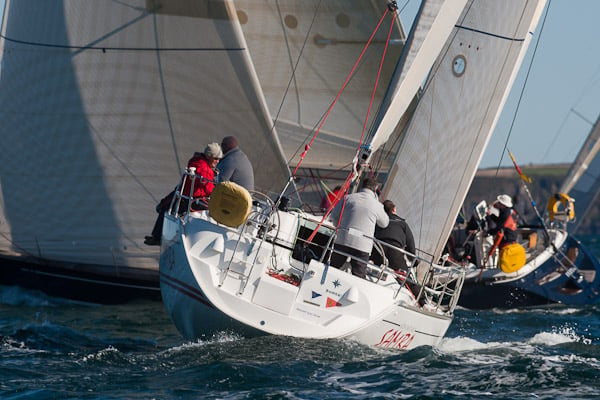
Tight racing in the penultimate race of Royal Cork's October League. Photo: Bob Bateman. Scroll down for more photos from yesterday
Classes Zero, One and 1720s got the nicest wind on the laid course to day. Race Officer Richard Leonard and his race committee in Capta Ventum, kindly provided by Pascal Healy, certainly made the best of the day. Today Richard decided on a change of format and started the 1720s first followed by Classes Zero and One together and then Class Two. He gave the fleets short courses providing very tight racing ensuring the crews had plenty of hard work and also providing very exciting viewing with a few heart-stopping moments. The 1720s, Zero and One did three rounds and Class Two did two rounds. With a northerly breeze of some 10 knots gusting to 12 and occasionally 14, it was to provide a tantalising taste of what was to come and there was no disappointment. Voices that hadn't needed to be raised at marks on previous Sundays found the necessity to make themselves heard today and the action was fascinating with hard work on the boats but a sense of great sailing exhilaration emanating from them.
Coming into race two of the day the skippers and crews had got the bit well between their teeth and were all like bucking broncos at the start line. In Class Zero there was an individual recall sounded. Jump Juice and Freya answered the call immediately and returned to restart and after some little while Gloves Off returned and while not knowing the reason why, one can only assume the helmsman perhaps was not quite convinced he had been over but then decided to return having considered it. Again the wind duly obliged and as in the first race, there were boats to the left, boats to the right and boats pretty well everywhere one looked. In Class Zero Tom Roche's Meridian from Kinsale had been performing extremely well but was slightly under
crewed today and was unlucky enough to have an incident at the weather mark in this race and after that things just did not go their way and they retired. This must have been disappointing as they had been doing so well. With Jump Juice winning the first race today and Gloves Off taking the second race and first overall to date in the series, the last day of racing next Saturday will be crucial as these races will be non discardable.
Race Officer Anthony O'Leary stood in to day for David O'Brien and the committee boat Sabrone was again kindly provided by Admiral Paddy McGlade. It was not such a lucky day wind wise inside the harbour for Classes Three and Four and White Sail 1 and 2. There was also extremely low water to day
and some of the skippers mentioned they had in fact touched rocks. Nonetheless they enjoyed good racing if at a somewhat lower pace than the competitors on the laid course.
At this point in time Class Three IRC looks like a two horse race with Tiger on 9pts followed by Bandit on 11pts. Class Four has a very similar situation with Sundancer on 9pts followed by Granny knot on 11pts. In White Sail 1 IRC Minx 111 had a good day to day with a first and second and currently has 7pts overall and the two big boats in the fleet Chancer from Kinsale and Aisha from RCYC are on 14pts each. In White Sail 2 IRC Plumbat is on 6pts overall with Phaeton on 9pts and Silk Breeze on 12pts.
And so we are coming to the final race of this exciting series. All competitors should note carefully that racing will take place on SATURDAY NEXT OCTOBER 30TH. The prize giving dinner will take place that evening at the Club House .
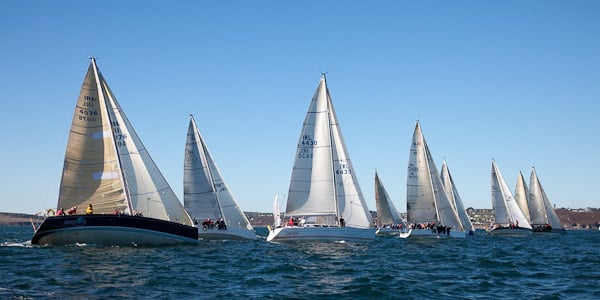
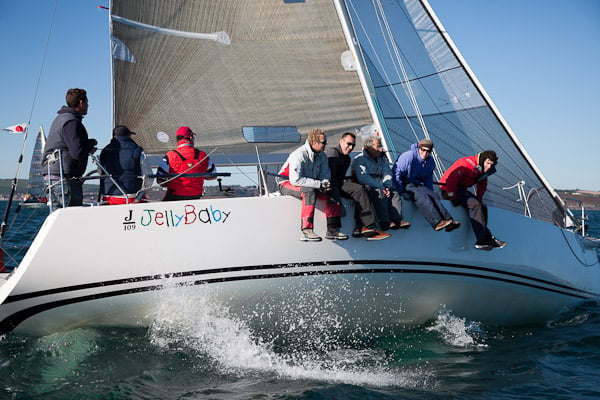
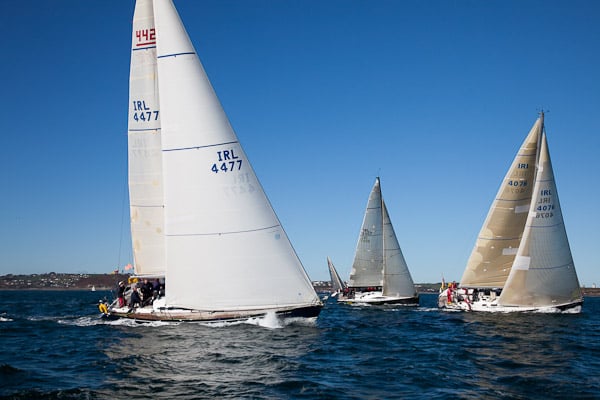
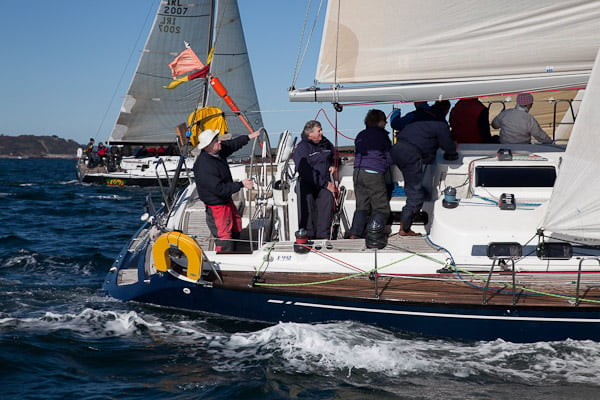
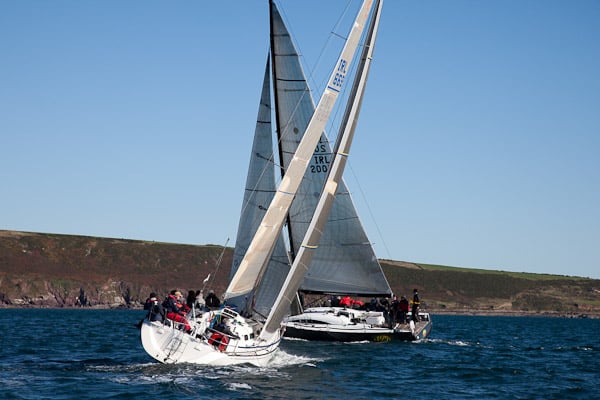
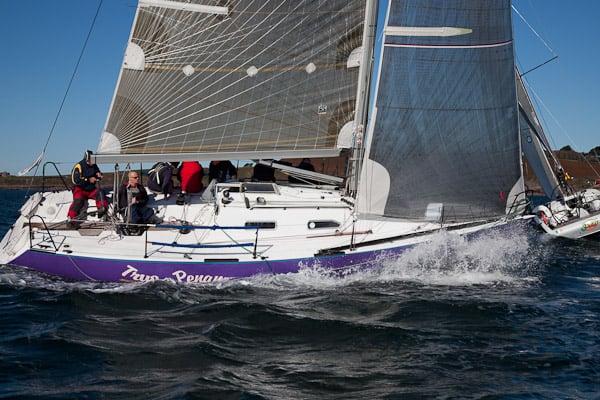
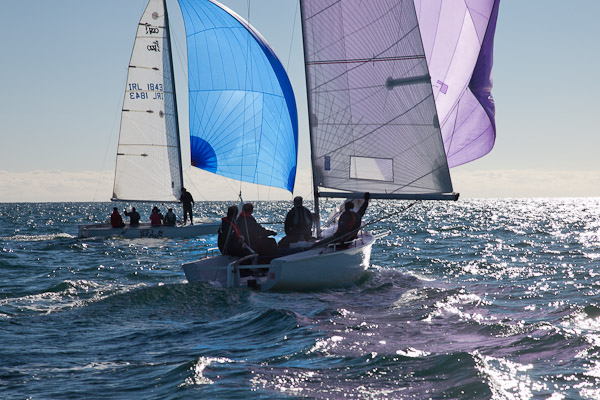
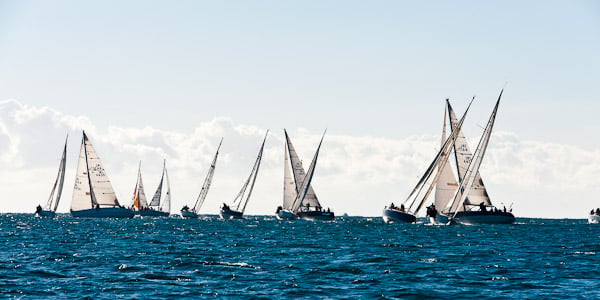
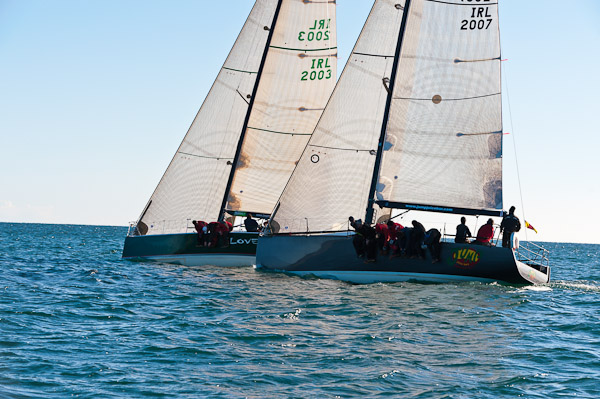
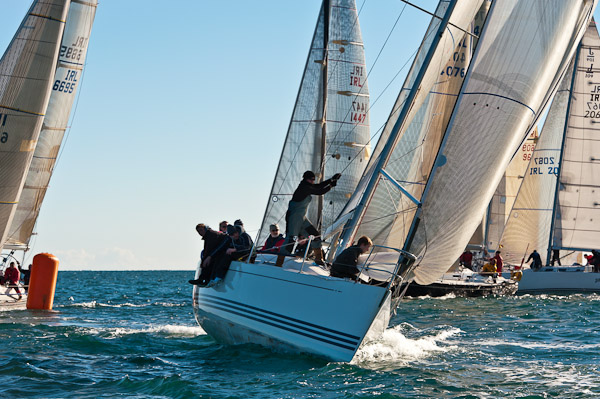
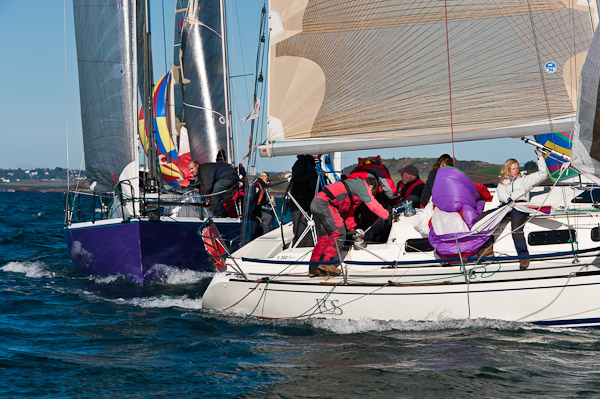
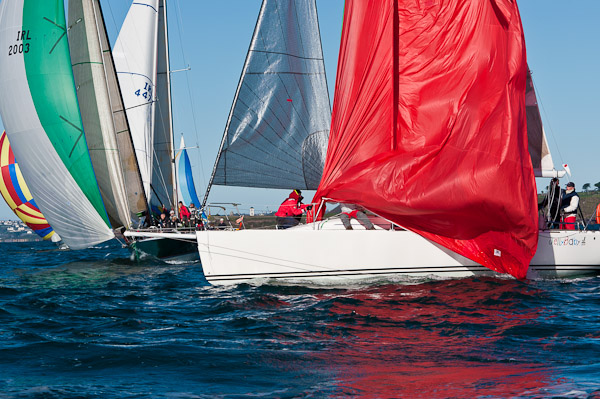
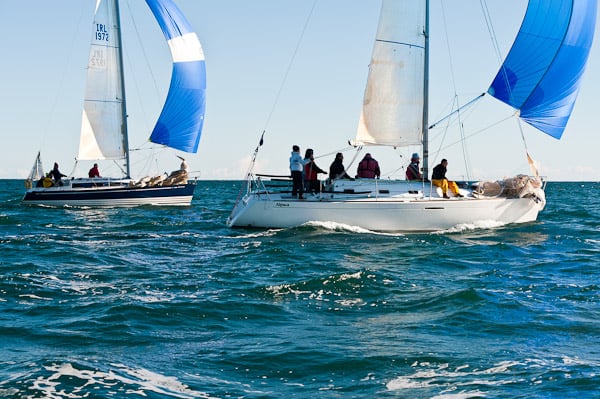
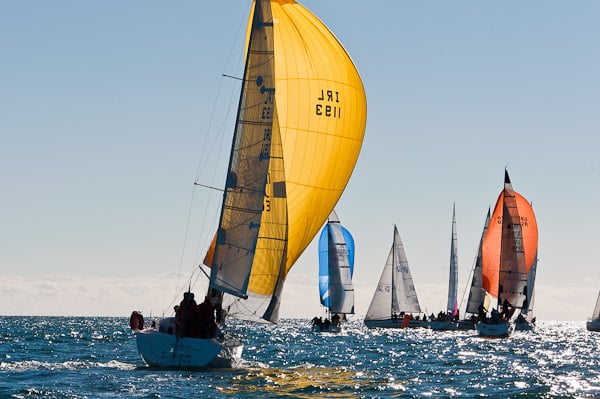
MORE OCTOBER LEAGUE GALLERY IMAGES HERE
O'Regan and Flanigan Win 420 Champs
There was an abundance of sailing talent at the start line and Saturday's sailing took place in 15 to 20kts of breeze with Rob Lehane and Andrew O'Donoghue taking the overnight lead from Richie Harrington and Robbie English with Emma Geary and Niamh Connolly third in a fleet of sixteen boats.
Day two was back to Cuskinny with light north westerlies and saw Jane Butler and Jenny Andreason taking the first race. Emma and Niamh won the fifth race and Cian O'Regan (KYC) and Scott Flanigan (Howth YC) took the final race thus winning the National Title. Rob Lehane was second with Emma and Niamh taking third position and First Girls Boat.
420 National Championships 2010
1 53156 Cian O'Regan M Scott Flanigan M 13 2 4 9 4 2 1


























